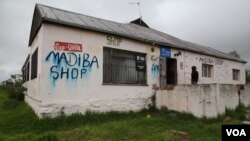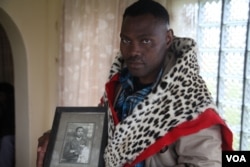MQHEKEWENZI, SOUTH AFRICA —
At his burial on Sunday, Nelson Mandela will be mourned as one of the world's greatest statesmen and South Africa's most famous export. But in a remote village near his homeland in the Eastern Cape, he will be grieved as royalty. It's here that Mandela spent 10 years as the adopted son of a king to the Thembu clan, and developed a close and lasting bond to the king's family.
Mandela arrived in the village at age nine to be a ward of Thembu King Djokintaba after losing his father in the nearby village of Qunu. He was known for always being serious, having the look of a leader and growing close to the king through his special chore of ironing all his robes.
Djokintaba named him “Tatomkhulu,” meaning grandfather, raised him alongside his two children and, along with his son Justice, to be a counselor, before the boyhood pals both fled arranged marriages to Johannesburg.
But for Chief Zanomethetho Mtirara - Justice's grandson - Mandela became a true grandfather when his own died, taking time out of fighting apartheid to ensure his royal relatives were taking care of themselves.
Mtirara - who was a student when Mandela was released from prison in 1990 - was desperate to see the man he adored, but hid from him for years for fear of recriminations over his dreadlocks and incomplete studies.
When they ran into one another during a village visit in 1999, he recalls the verbal and very public lashing Mandela gave him for not spending enough time at home, and how he treasured the attention.
“When finally I was given a chance to speak, I said to him, 'you know what Madiba? I want to shake your hand, for all you were angry about outside," he said. "Because for me, it showed that you really cared about me.'”
On Sunday, Mtirara and the rest of the royal family from the Thembu, a sub-clan of the Xhosa tribe, will be cloaked in traditional animal skins - leopards for chiefs and a lion skin for the king. To mark Mandela's royal blood, a leopardskin also will be draped over his coffin.
A special stick, known as “umquma” will be placed on top of the coffin among the flowers. It will have traveled from this tiny village to Mandela's home in Johannesburg to collect his spirit, as Thembu culture believes that the dead cannot rest unless their spirit is reunited in this way with their final resting place.
And during its journey, the spirit collector is bound by silence lest he or she break the spell.
“We will take off a branch from here, and fly it to Johannesburg and carry the spirit in that branch, and the person who needs to perform that task, on the way back home, he is not allowed to talk to anyone who is in that entourage,” Mtirara said.
Although the Thembu clan is making sure that the sacred stick and leopardskin will be included in the funeral, they say that South Africa's ruling ANC party and presidency are vying for control of an event that has already been the subject of many family squabbles.
Mandela's grandson Mandla has pushed for burying his grandfather in nearby Mvezo rather than in his boyhood village of Qunu, which is little more than a cluster of houses on a hillside.
But Mtirara remembers Mandela telling him, Mandla and some journalists on a visit to Qunu in 2001 that he wanted to be laid to rest at his earliest home.
“We had to take a drive from the house to the graveside in Qunu where he then answered this question with 'no, this is where I'm going to be buried.' That was Qunu graveside,” said Mtirara.
Mtirara said so many people wanted a part of Mandela that he is now owned by society. For the Thembu people and especially Mandela's adoptive family, though, he was a grandfather, a chief and a royal who took his earliest lessons of leading people to extraordinary heights.
Mandela arrived in the village at age nine to be a ward of Thembu King Djokintaba after losing his father in the nearby village of Qunu. He was known for always being serious, having the look of a leader and growing close to the king through his special chore of ironing all his robes.
Djokintaba named him “Tatomkhulu,” meaning grandfather, raised him alongside his two children and, along with his son Justice, to be a counselor, before the boyhood pals both fled arranged marriages to Johannesburg.
But for Chief Zanomethetho Mtirara - Justice's grandson - Mandela became a true grandfather when his own died, taking time out of fighting apartheid to ensure his royal relatives were taking care of themselves.
Mtirara - who was a student when Mandela was released from prison in 1990 - was desperate to see the man he adored, but hid from him for years for fear of recriminations over his dreadlocks and incomplete studies.
When they ran into one another during a village visit in 1999, he recalls the verbal and very public lashing Mandela gave him for not spending enough time at home, and how he treasured the attention.
“When finally I was given a chance to speak, I said to him, 'you know what Madiba? I want to shake your hand, for all you were angry about outside," he said. "Because for me, it showed that you really cared about me.'”
On Sunday, Mtirara and the rest of the royal family from the Thembu, a sub-clan of the Xhosa tribe, will be cloaked in traditional animal skins - leopards for chiefs and a lion skin for the king. To mark Mandela's royal blood, a leopardskin also will be draped over his coffin.
A special stick, known as “umquma” will be placed on top of the coffin among the flowers. It will have traveled from this tiny village to Mandela's home in Johannesburg to collect his spirit, as Thembu culture believes that the dead cannot rest unless their spirit is reunited in this way with their final resting place.
And during its journey, the spirit collector is bound by silence lest he or she break the spell.
“We will take off a branch from here, and fly it to Johannesburg and carry the spirit in that branch, and the person who needs to perform that task, on the way back home, he is not allowed to talk to anyone who is in that entourage,” Mtirara said.
Although the Thembu clan is making sure that the sacred stick and leopardskin will be included in the funeral, they say that South Africa's ruling ANC party and presidency are vying for control of an event that has already been the subject of many family squabbles.
Mandela's grandson Mandla has pushed for burying his grandfather in nearby Mvezo rather than in his boyhood village of Qunu, which is little more than a cluster of houses on a hillside.
But Mtirara remembers Mandela telling him, Mandla and some journalists on a visit to Qunu in 2001 that he wanted to be laid to rest at his earliest home.
“We had to take a drive from the house to the graveside in Qunu where he then answered this question with 'no, this is where I'm going to be buried.' That was Qunu graveside,” said Mtirara.
Mtirara said so many people wanted a part of Mandela that he is now owned by society. For the Thembu people and especially Mandela's adoptive family, though, he was a grandfather, a chief and a royal who took his earliest lessons of leading people to extraordinary heights.






